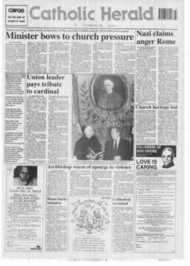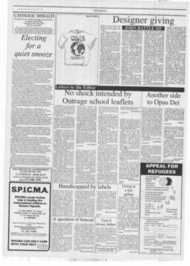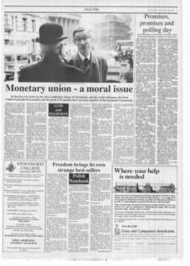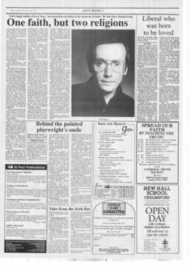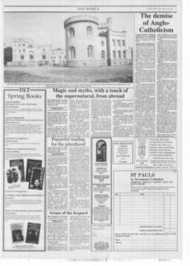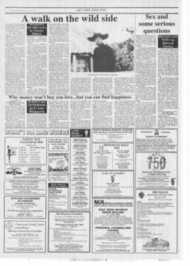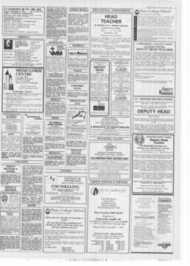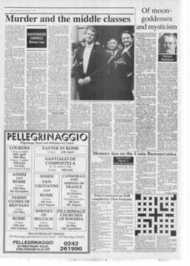Page 6, 14th February 1992
Page 6
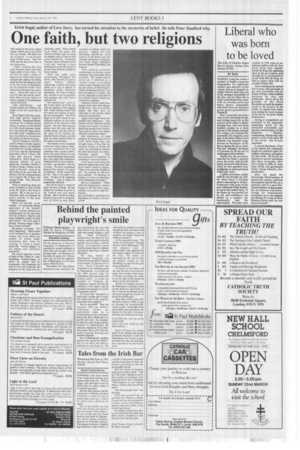
Report an error
Noticed an error on this page?If you've noticed an error in this article please click here to report it.
Tags
Share
Related articles
Morality And The Monetary Union: European Parliament...
Saved By The Bells Of The Altar
Christ Had Risen, But Joy Only Came Later
Once Upon A Time ...
Boutique Musical For Weeping Classes Is Great Fun
Erich Segal, author of Love Story, has turned his attention to the mysteries of belief. He tells Peter Stanford why.
One faith, but two religions
THE mother of one of my college friends walked out of Love Story half way through. She hadn't run out of tissues. It was because Ryan O'Neal swore . That was 1970 and she has never been to the cinema since.
I didn't mention this lone voice of protest when 1 met Erich Segal, author of Love Story. It's not that he lacks a sense of humour but simply that he has exhausted his capacity for talking about the film that earned an entry in the Dictionary of Quotations for the immortal words "love means never having to say you're sorry". And in any case, it was over 20 years ago and he clearly feels there are new themes to explore judging by his subsequent ventures into print.
Like Catholicism and Catholic priests and celibacy, the subject of his new novel Acts of Faith.
Erich Segal's first floor study, with huge picture windows overlooking Hampstead Heath, would put the Catholic Central Library to shame so well stocked is it with church reference books. For every point Mr Segal makes, he is able to pull a scholarly tome from the shelves to demonstrate the veracity of what he is saying.
The air of being at a tutorial in a don's rooms at a rather superior Oxbridge college is not altogether misplaced for, besides penning Love Story and the international bestsellers Oliver's Story, The Class and Doctors which followed it, Erich Segal is a classical scholar of great distinction. Currently a Fellow of Wolfson College, Oxford, he has taught at Harvard scene of all that rolling in the snow with Ali McGraw and the aforementioned foul tongued Mr O'Neal, but enough of that Yale, Princeton and Munich.
What is surprising about his choice of subject in Acts of Faith is that Mr Segal's own creed is Judaism. He is the son of an Orthodox rabbi and himself an active member of the local Liberal synagogue.
Wasn't he nervous as an outsider of exciting the literary equivalent of my friend's mother's cinema walkout by tackling head-on the.one issue that the Catholic Church, and many Catholics, prefer to keep quiet about? Of,. as he puts it himself, "treading where I didn't have a licence to tread"?
His answer is simple. "It's what's happening". And he turns to his bookshelves to produce chapter and verse about the number of priests either abandoning their vows for marriage or living a secret double-life "broken celibacy" as one bishop once delicately described it.
The central character of Acts of Faith is New Yorker Fr later Archbishop Timothy Hogan. In effect an orphan and by consequence a bit of tearaway, he falls in love with Deborah, the daughter of the local strictly Orthodox rabbi. When Rabbi Luria finds out about this innocent teenage crush, he sends his daughter away to Israel to find a nice Jewish boy. In despair Timothy buries himself in his work and, wanting to have nothing more to do with women if he can't have Deborah, decides he has a vocation.
Their two paths cross occasionally throughout the novel, with Timothy, by now a senior Vatican official, undergoing a radical conversion while on a trip to Brazil to discipline errant liberation theologians. He conies to believe that vocation is not incompatible with marriage, and...well I won't spoil the rest.
The essential point and to be fair it does chime out of the text with the regularity of the Angelus bell is that wanting to serve God as a priest and wanting to marry are not incompatible. And Erich Segal is as well versed as any Catholic scholar in the early practices of the church in this regard the fact that married priests were the norm until the twelfth century, that they still are the norm in the eastern rite churches loyal to Rome, and that there are some married clerics in the western church today.
"The essence of my complaint is that you cannot ignore reality. I'm not a polemicist but I am exploring what creates conflict. In my last book Doctors it was the moral dilemmas that doctors face over issues like euthanasia. In Acts' of Faith it's how religion not faith can separate a man and a woman. The great occupational hazard of the vocation of a priest is loneliness. People cannot take the life. Man is not made to be alone. Its there at the beginning of Genesis." And, of course, he produces the reference.
But Erich Segal's research hasn't all been in books. He has walked the corridors of power in the Vatican and met senior officials. But it would be unfair, because of my remit, to categorise Acts of Faith as only about
questions of Catholic belief and practice. Indeed the most interesting and for me novel aspects of the book were the contrasts and points of tangency that Erich Segal highlights between Roman Christianity and Judaism.
Both creeds are portrayed, convincingly, as having a great suspicion, even pessimism about sexuality. The rough justice meted out to Deborah as a "weaker vessel" in a religion where young Orthodox boys still say the prayer of Erich Segal's childhood thanking God that "you hath not made me a woman" will not be unfamiliar to that half of the Catholic Church denied any real power or authority.
Orthodox Jewish women have already made clear their distaste for the novel. They have told the author that they have no objections to the archaic ritual purity laws he describes.
Again Erich Segal draws the parallel with Catholicism. "The reaction of the Orthodox Jewish women was similar to what I heard from women in the Vatican. They told me they were happy with their second class status."
His exploration of both religions in researching Acts of Faith, Erich Segal says, has brought home to him that his classical studies in Greek and Latin "are meaningless without the third dimension, the JudeoChristian aspect. That interconnection of traditions is something I've never felt before."
If his book could bring the different religions any closer, then Erich Segal would be happy. "There is so much that divides us still. For example we still have three sabbaths for Moslems on Fridays, for Jews on Saturdays and for Christians on Sundays."
But he is optimistic. "After what has happened in eastern Europe in the last three years, nothing is too much to hope for". Perhaps...
Acts of Faith is published by Hutchinson on February 20, price 114.99
blog comments powered by Disqus


